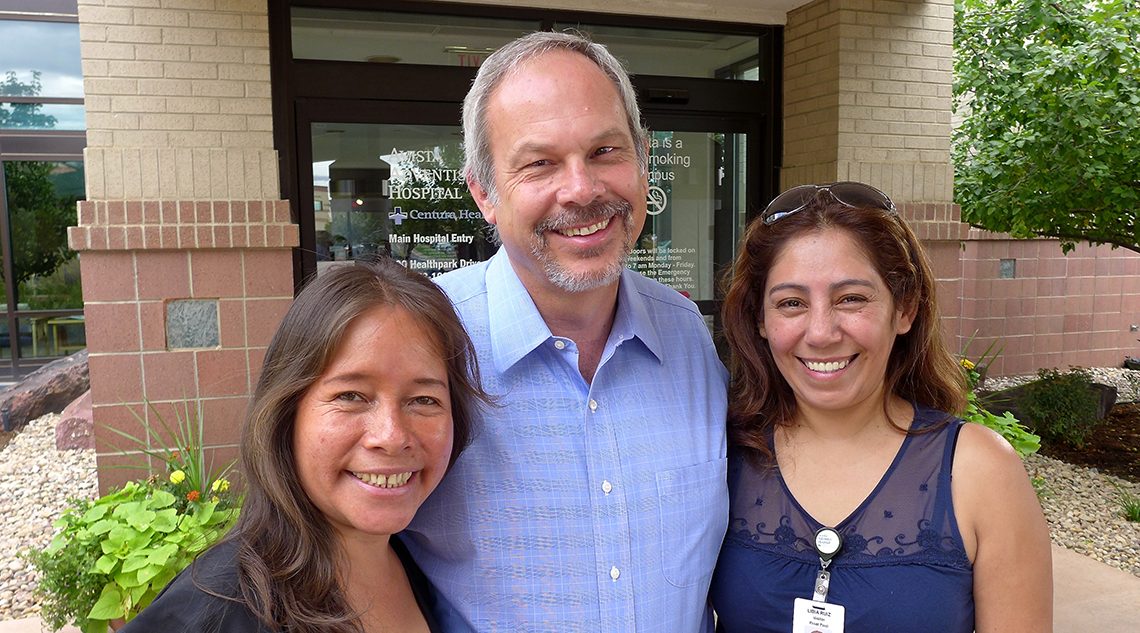Two nurses from Iquitos, Peru, visited Avista Adventist Hospital for training last August. Libia Ruiz and Karen Souza spoke enthusiastically about their “happy opportunity” to spend a week on the Avista campus in Louisville, Colorado. Coordinated under Centura Health’s Global Health Initiative, their visit was part of an ongoing exchange of medical administrators, professionals, and staff between Avista and Clinica Adventista Ana Stahl, a 40-bed medical institution on the shores of the Amazon River.
Clinica Adventista is one of three hospitals operated by the Seventh-day Adventist Church in Peru. Ruiz is manager of Clinica Adventista’s surgery nursing team. She says her visit “is about gaining a better vision…and observing a difference in techniques and processes we use with surgeries.”
Avista initiated the training exchange with Clinica Adventista nine years ago. David Meza, a financial counselor at Avista, recalls his first impressions of the Peruvian hospital when he visited in 2006: “I remember seeing ants and flies in the operating room. Hygiene was their challenge. Today, everything is different. The hospital’s cafeteria serves gourmet meals nowadays!”
Avista’s involvement with Clinica Adventista has extended far beyond a one-time event. Each trip includes direct interaction between staff members in Peru and Colorado. “What you notice now is a change in quality of medical care. Hospital leaders have come to observe, then they go back, and now we see a change at their clinic,” says Meza.
Once a month, Avista CEO Dennis Barts consults with Clinica Adventista administrators and managers via Skype. He says his first visit to Iquitos made him realize “that sustainability of their hospital is really important…including their business plan, their business model, and ways for expansion.”
During their visits, Clinica Adventista administrators and medical staff have received training in patient and employee satisfaction, patient safety, nursing education, leadership, financial services, and human resources. During their recent visit, Barts says that Ruiz and Souza “learned a great deal about safety, quality, patient care, and about processes to make them more efficient and more effective. Our staff spent perhaps 60 to 70 hours with them in the week they were at Avista. We brought in translators to make sure that the communication was very clear.” He is satisfied that their visit was well worth the investment made by Global Health Initiative.
The blessing is mutual. When an Avista medical mission team visits Clinica Adventista, they return with stories of how they were blessed beyond what they had to give, says Barts. They may treat as many as 1,000 patients during a visit. Many of them “take their children, their teenagers with them. It helps their teenagers realize that the latest video game, or the latest smartphone, the latest tablet, or the latest gadget is not nearly as important as changing people’s lives.”
Calvin Smith, who coordinates surgical services at Avista, previously served as a missionary in Peru. For him, participation in the visits to Clinica Adventista is a way to give back. “Surgery is a one-time event,” he says. “For a patient coming to surgery, it is a huge event, especially when an American doctor performs it.”
During their recent visit to Avista, Ruiz and Souza especially enjoyed training for CPR. “What I would like to take with me is a mannequin,” said Souza. “This will give me the capacity to help train others.”
Did they miss anything during their 10-day journey to Colorado and back? Their response highlights the sacrifice made for the opportunity to learn and to give back to their community.
“I miss my children,” Ruiz said.
“And of course my husband,” Souza added.
—
This article was submitted by Stephen King, senior vice president for the Rocky Mountain Adventist Health/Centura Health, where he serves the five Adventist hospital campuses in Colorado. It was written by Rajmund Dabrowski and edited by Mark Bond.










